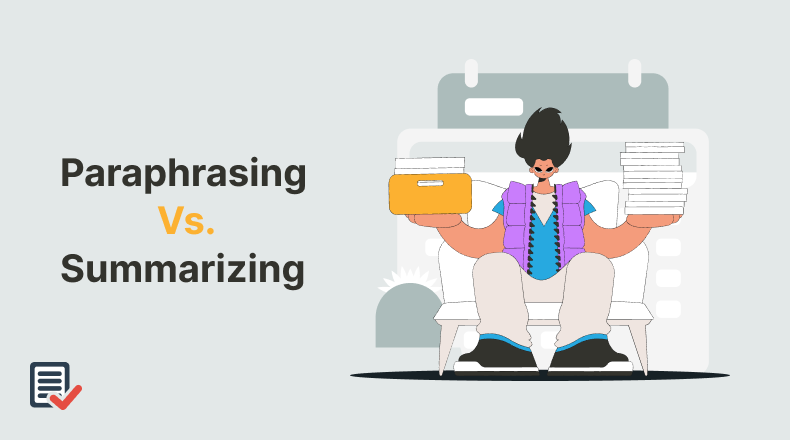
Students and researchers working on academic submissions and research publications use in-text citations to reference other people’s ideas and words. Bloggers who craft lengthy write-ups targeting various niches also source content from other publications and use citations to help readers identify the actual source of information, data, and opinion. However, there are two distinct methods exist for in-text citations. One is termed quoting, while the other is called paraphrasing.
However, many writers fail to differentiate between these methods. The main reason behind this phenomenon is a lack of knowledge about the key differences between these methods. However, this article outlines the definitions of both these methods, the key differences between them, and best practices that should be considered while using them to refer to other’s ideas or words. Let’s get started without any further ado.
What is Quoting?
Quoting refers to the process of inserting a passage from another source as it is into your writing. When quoting a passage from another source you simply copy it and write it in exact wording without the slightest modification. Using quotation marks around the quoted content from another source will help readers understand that you haven’t written it. After adding the quoted text, you must attribute the original author according to the recommended citation format.
What is Paraphrasing?
Paraphrasing refers to the process of stating the ideas or words of another author. However, it involves presenting someone else’s ideas by rephrasing the sourced information in your own words to fit your writing style. You must attribute the original author even if you paraphrase the sourced content. Paraphrasing doesn’t require you to surround the rephrased wording with quotation marks. All you need to do is perform in-text citations and give credit to the original author.
Further details about key differences and best practices are given below.
Quoting Vs Paraphrasing – Key Differences
The factors that differentiate both quoting and paraphrasing from each other are given below.
Quoting:
Here are some things that differentiate quoting from paraphrasing:
- Word Choice: As mentioned earlier, the writer using quoting to refer to ideas or words uttered by someone else must add sourced information to the writing with no modification. Simply put, you must reproduce the content in exact words while adding it to your writing.
- Preservation of Words: Quoting is all about preserving words as the sourced information is directly reproduced in the writing.
- Indication: Quotations featuring sourced content with exactly similar wording are indicated using quotation marks or creating a distinctly formatted block with indented text.
- Suitability: Quoting is more suitable when you want to insert short phrases or direct statements into the content that are pivotal to the argument you are presenting through your writing.
Paraphrasing:
Paraphrasing differs from direct quoting for various reasons. Here are some factors that help you understand them better.
- Word Choice: Paraphrasing focuses on conveying the idea from the sourced information in different wording so that it can easily match the writing style. The writer must modify the information and convey it in their own wording to paraphrase sourced content.
- Preservation of Core Meaning: Unlike the quoting method, paraphrasing preserves the core intent by allowing the writer to rephrase the information completely using their own vocabulary and writing style.
- Indication: As mentioned earlier, paraphrasing doesn’t require the writer to place quotation marks around rephrased information. Mentioning the source in the recommended in-text citation format is enough.
- Suitability: Paraphrasing is more appropriate when you have to source a lengthy block of text from another source and condense it for easier integration into your writing. Moreover, writers can use it to demonstrate a deeper understanding of sourced material because it requires them to thoroughly grasp the idea communicated by someone else and then reproduce it in their own wording.
Quoting Best Practices
You must pay attention to best practices for quoting to avoid plagiarism allegations and ensure academic integrity. Here are a few of them.
- When you want to cite a particular definition or technical term, opting for direct quoting and reproducing sourced content in exact wording is better.
- It is better to go with the direct quoting method when the sourced content is central to your argument. You can also use this method to effectively convey a particular point.
- You can surround short phrases with quotation marks while quoting. However, if the need to quote a passage directly arises, using the block format with indented text is better.
Paraphrasing Best Practices
You must keep a few best practices in mind while paraphrasing sourced content. These practices are given below.
- Paraphrasing is far more effective when you want to ensure the smooth integration of sourced material into writing.
- Paraphrasing is a perfect way to condense long blocks of text so that sourced material doesn’t add too much word count.
- You must make sure that the rephrased information looks totally different from the originally sourced material to avoid plagiarism allegations and ensure academic integrity.
In the End:
Quoting and paraphrasing allow writers to source information from other publications. However, both methods work differently. One is about preserving wording, while the other focuses on preserving the core meaning. You must understand the key differences between these methods to appropriately use them in your writing.
Additionally, you must be aware and follow the best practices while paraphrasing or quoting sourced information. This article has covered all these elements in detail. Hope, this information will help you in crafting informative and appealing content effectively.







